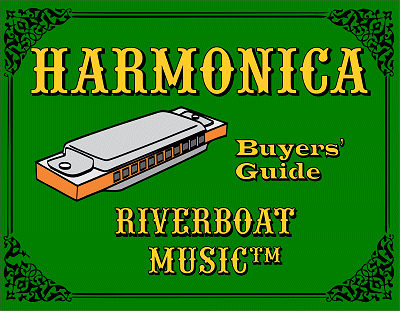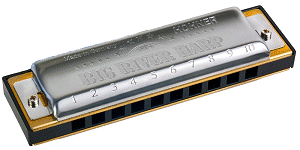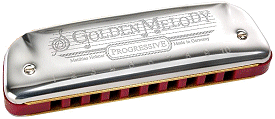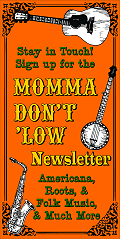 | |||
 |
5-string - 6-string - 4-string Others - Accessories |
||
Dreadnoughts - Archtops Classical - Parlor Starter - Jumbo - Tenor |
|||
Saxophones |
|||
 | |||
 |
5-string - 6-string - 4-string Others - Accessories |
||
Dreadnoughts - Archtops Classical - Parlor Starter - Jumbo - Tenor |
|||
Saxophones |
|||
Written by Paul D. Race for
 , ,  , and , and  |
|
Buyer's Guide for Harmonica - From Riverboat Music(tm), This page is meant to arm you with the basic information you need to buy your first real harmonica, focusing on the most common playing styles in the US and the most popular keys. We also will provide links, as available, to specific products on online vendors' sites, with the caveat that these are suggestions, and you should do as much research as you feel your decision merits before deciding what to buy and who to buy it from. On the other hand, if you just want a "bottom line" "What should I buy first?" recommendation, either for yourself, or as a gift, we have those toward the end of the article as well. By the way, lots of folks have nicknames for harmonicas, including "harp," and "harpoon." A hundred years ago, they called it a "mouth organ." So you might hear someone say something like, "Oops; I left my C harp in my banjo case." That sentence makes a lot more sense to musicians than it does to civilians. What Kind Of Music Do You Want to Play?Most kinds of American folk, pop, blues, or rock music use a simple 10-hole harmonica, like the Marine Band that Hohner is known for. But the same harmonica can be used entirely differently by two different players.
So if you bought a cheap G "Blues Band" harp at Cracker Barrel and you want to play "Red River Valley" on it, you'll play it it G. If you want to play the blues on it, get your guitar playing friends to play a blues in D (yes I know that's a sacrilege). Your First HarpChances are you've already picked up a G harp at Cracker Barrel or somewhere. You might even be able to practice and jam on the thing - for most of the last century, that's how most kids started out. You might be able to play Shenandoah on it by now. Or the "Beer Barrel Polka," a song my Dad used to play on his harmonicas. You can even get started trying to learn Cross Harp on the thing, but you may discover that sucking hard to bend those notes puts extra strain on the inexpensive reeds, and wears the thing out quickly. can even get started trying to learn Cross Harp on the thing, but you may discover that sucking hard to bend those notes puts extra strain on the inexpensive reeds, and wears the thing out quickly.
If you're thinking about getting serious, you'll need to upgrade. If you're only talking one harmonica, it's not that hard to come up with enough cash for a German-made Hohner. The least expensive in this category is probably the Big River
By the way, for years the Special 20s said "Marine Band" instead of "Progressive." That was Hohner's way of saying that they're very close to Marine Band in sound and playing except for the plastic comb. Some time in 2014, we started seeing the "Progressive" stamping, like that in the photograph above. A harmonica tech who has chimed in on the change says that it is only cosmetic. Probably it's Hohner's way of admitting that plastic combs are displacing traditional Marine-Band-style wooden combs in popularity among X and Y-gen players. So if you order a Special 20, don't freak out if the one you get looks a little different from this one. Wood-Combed Harmonicas
The Big River and Special Twenty may look cheap to you because the comb (body) is made of plastic. After all, wood is traditional. Some folks feel it gives a more traditional tone. If you're interested in a wood-combed harp in the same general price range as the Special 20, you could check out the very traditional Marine Band I've played Cross Harp and straight harp on them both. The Marine Band harp has a richer tone - better for "straight harp," but some folks have trouble bending notes on it. I "grew up" on wood-combed harps, so I should be bigoted in their favor, but for my purposes a plastic-combed harp is better. For example, I may play one or two songs on the thing then have to put it up moist. That's bad for any harp, but especially bad for wooden-combed ones. Other Harps Worth Mentioning The Hohner Golden Melody
The Hohner Golden MelodyThe Specialty HarpsBelieve it or not, except for the differences in materials, shape, and finishes, all of the harmonicas above are played exactly the same way. So if you start out on an $8.50 Blues Band, migrate to a Big River, and then to a Special 20, and then you want to get a Marine Band, Blues Harp, or Pro Harp, everything you learned from your first harp will carry over to the next one and so on. As a class, they are often called "diatonic" harmonicas, which means they're designed to play the notes of the scale they're pitched in and not much else.But if you can't tell by now, Hohner is all about innovation. The following harps are used mostly by "straight harmonica" players - a few can't even be used for Cross Harp, but you might come across them, so you might wonder if they'll do you any good. On the other hand, if One family of harps that old-school harmonica soloists like is the Echo Another popular family of harmonicas is the Chromatic Some folks claim that having a chromatic harmonica means that they only have to take one harmonica anywhere. But you can't use the lower octave in every key, because it doesn't have all the notes, so some Chromonica players wind up having multiple harps anyway. Except for two extra C notes, if you leave the button alone, these play a lot like a "normal" diatonic harmonica. So some rock and blues players have added these to their arsenal because of the extra notes on them. There are too many other specialty harps to go into, but here's one you might stumble across - the "Country Tuning" Special 20. It's a Special 20 that is designed for Cross Harp playing, but the note that would ordinarily be a flatted seventh when you inhaled on the lower part of the harp is a normal seventh. So a "C harp" has an F# where an F would ordinarily be. This makes it hard to play some songs in C on that C harmonica, but makes it easier to play certain songs in G. Go figure. Even if you play Country, this should not be your first harmonica, or you'll find yourself wondering what's wrong with virtually every other harmonica ever made. How Many Harmonicas Will I Need, Anyway?If you're a singer-songwriter playing your harp on a neck brace while you strum your guitar, you probably only need one or two harmonicas, since you probably write most of your songs in the same few keys. On the other hand, if you're in a "cover band" or other ensemble that plays a lot of different styles and keys, you may need a bunch of harps to keep up. "Wait a minute!" you say, "You just told me that I should invest $40-60 or more in my first "real harmonica. And now you're saying that I might need a dozen of these things eventually? That's a lot more than $40!" No, you won't probably need a dozen harps, but if you start doubling on harp more than once or twice a set, you might find it helps to have a little more choice. If you've been playing harp a while and figure it's worth expanding a little, it helps to know that Hohner also bundles 3 or 5 (or in some case 7) popular keys together into a single package, which will cost you less than buying the harps individually. Of course, you probably will be getting at least one "duplicate" that way, but it doesn't hurt to have a backup for your favorite harmonica. Here are some sample sets you might consider when you're ready to start adding other keys, or upgrading your whole collection. I've added links, where available, to product listings on Amazon.com, so you can see reviews and "comparison shop" right on your PC. Chinese-Built Harp Packs - If you start looking at this sort of set online, you'll also see several of the really inexpensive Chinese sets packaged this way, including the "Piedmont Blues," "Hoodoo Blues," "Hot Metal," and "Blues Band." You may also wonder why you can get a whole set of Chinese-made harps for less (in some cases, much less) than the cost of one single German-made Hohner. Until they arrive in the mail. That said, if you have a rocker in your family that isn't already addicted to expensive harmonicas, a set of Hot Metal What's the Bottom Line for Beginners?The "short version" is that if you're really just starting out on harmonica, and you want to play blues or rock, consider buying a Hohner Big River or Special 20 in the key of C, then work your way out. Your next harp would probably be a G, followed by an F, followed by a D, followed by a Bb, followed by an A, and so on. Yes, you can get into "real money" eventually, but just stop dining out so much or something, and you'll never notice the expense.The same goes true for gift-giving. Yes, Chinese-made harps give kids something to drive their parents crazy with, and they're great stocking stuffers or gag gifts, but if you have a musician friend who you think would like to learn harmonica, consider a Big River or Special 20 in the key of C to start out. If the harmonica player in your life already has a harp he or she likes, you can always buy the same model harp (or one step up) in the next logical key. (Once again, the most useful sequence of harp accumulation is usually C, G, F, D, Bb, A, Eb, E, Ab, B, Db, F#, although most harp players seldom go beyond the first six or seven in the series.) Recent ExperiencesYou don't have to read this part - it's just a bit of my own recent experience to cap off the anecdotal material above.I recently bought a five-pack of Hohner Special 20 I needed to get multiple keys since I never know what key(s) I'm going to have to play in when I accompany or jam with other folks. (I got E, A, D, G, and C in the set. I also bought F, Bb, and Eb separately) I also decided to get a matched set so I wouldn't have to keep adjusting when I went from one to the other. The truth is, that for keys like Ab or Db/C#, F# or B, I could probably get by just fine with an $8 harp. But they don't make the cheap harps in those keys, so if I ever want to complete the set, I'll have to buy something in the same price range anyway. The next step down is the "Big River," but when you buy those individually online, they're only a few dollars cheaper than the Special 20s anyway. Plus reviewers weren't as enthusiastic about their durability as they are about the Special 20s, Marine Bands, and Pro Harps. ConclusionHowever you chose to acquire the harmonica(s) coming into your household, we wish you the best, and we'll answer your questions if we can. We've also included a harmonica-flavored version of our normal site caveats below, so take a look before you place an order. Note about Suppliers: While we try to help you get the instruments and other products you want by recommending suppliers with a good record of customer service, all transactions between you and the supplier you chose are governed by the published policies on the supplier's web site. So please print off any order confirmation screens and save copies of invoices, etc., so you can contact the appropriate supplier or invoke the product warranty should any problems occur.* Notes about Ordering Harmonicas Online: I used to buy my harmonicas from an area music store that had good discounts. But they closed years ago. Besides, they only carried the most popular keys, and how many G harps did I need anyway? If I need an "F" harp it was "special order," and I'd wind up paying list price anyway. If you're shopping for, say banjos and guitars, you might could get a reputable music store to "set them up" before you take them home. (The drones at the big box stores won't have any idea what you're taking about, though.) But harmonicas don't generally need "setup." And if they do, most music stores aren't equipped to do that work anyway. In other words, if you can get a good price on a harp you need from your local store, please give them your support. But don't imagine that spending a lot more money to buy locally will necessarily give you a better experience with your harps than getting them in the mail. If you do shop online, buy only from folks with a reasonable return policy and be sure to check it out as soon as you receive it. Every musical instrument has the potential for being damaged in shipment, even if the box looks fine when you get it. My experience buying German-made Hohner harps online has been 100% good. But other folks have reported problems with other brands or other countries of manufacture. You also need to understand that "not liking" a harmonica is not a justification for a return. NO harmonica dealer should take a harmonica back in return for any reason except serious manufacturer defect - it's just not safe to return them to stock. The ones who do will charge you for disinfecting and examination, as they should. So the safest thing, when you buy a harp, is assume you'll own it forever, and if you decide later that you spent $50 on the wrong harp, that's $50 you won't see again - or shouldn't, at any rate. DON'T Consider Buying Used: Of all the instruments in the world, harmonica is one of the few you don't want to buy used, for the same reason you don't want to drink after strangers in a bar. Harmonica playing requires you to inhale through the instrument as well as exhale. I HAVE been know to soak plastic-combed harps in rubbing alcohol and give them to family members who needed a harp at the last minute. But they're reasonably sure I don't have Ebola or something. Can you say that about the stranger who owned that harmonica you're looking at on the used market? Something to think about, anyway. For that reason, if you order a harmonica online and you see ANY signs that someone tried it out and sent it back, send it back without trying it out and insist that the vendor pay shipping BOTH ways. I broke my own rule a few months ago, when I saw a Chromatic harmonica identical to one my father used to own for a good price in great condition at a flea market. But you had better believe, I disassembled it and hit every surface with a disinfectant and let it dry out thoroughly before I reassembled it and tried the thing. Note about Availability and Pricing: Although I try to keep an eye on things and to recommend products that are reasonably available, the musical instrument does fluctuate, and any product on this page may change price or become unavailable without prior notice. If you "click through" to see details on a product, and nothing happens at all, or you are routed to a supplier's home page, please let me know and I will remove the product from the online listing until I can find a replacement or another supplier. *Here's an irony: every year, I receive about a dozen complaints from folks who have never been to my sites before, angry that a deal between that person and a vendor or manufacturer I recommend went south (in their opinion). They "googled" the product, saw my recommendation or review, then e-mailed me to tell me they were going to sue me or report me to the Better Business Bureau for personally ripping them off by recommending a product they had bought from someone else. Ninety-nine times out of a hundred, the problem is really because the customer didn't read the whole ad, or ordered the wrong thing, or threw away his paperwork and doesn't know where he bought it from, etc. I'm always polite, and sometimes I can even help them get things straightened out with the vendor, but it's not, technically, my problem. Click here to return to the text.
|  |
|||||||||||||||||||||||
| Visit related pages and affiliated sites: | ||||||
| - Music - | ||||||

|
 |
 |

|

|

|
|

|

|

|

|

|

|
|
| - Trains and Hobbies - | ||||||
 |

|

|  |
 |

|
|
| - Christmas Memories and Collectibles - | ||||||
 |

|
 |

|
 |

|
|
| - Family Activities and Crafts - | ||||||
 |

|

|

|

|

|
|